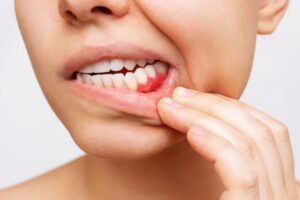
It’s a common belief that once teeth are removed, gum disease will disappear on its own. Unfortunately, that’s not always true. While tooth extraction may remove a source of infection, gum disease affects more than just your teeth—it also involves your gums, jawbone, and overall oral health. Understanding how gum disease works is key to managing it properly, even after extractions.
Gum Disease Affects More Than Teeth
Gum disease, or periodontal disease, begins when plaque and bacteria build up along the gumline, leading to inflammation and infection. In its early stage (gingivitis), gums may bleed or appear swollen. If untreated, it can progress to periodontitis, where the infection damages the bone and tissues that support the teeth.
Removing teeth can eliminate some areas where bacteria collect, but the infection often remains in the gum tissue and jawbone. Without proper treatment, bacteria can continue to thrive, leading to bone loss or even spreading to other parts of the mouth.
Why Extraction Alone Isn’t a Cure
If gum disease was the reason your teeth needed to be extracted, it’s a sign that the infection had already advanced. Extraction helps reduce pain and stops immediate damage, but it doesn’t address the root cause—the bacterial infection in your gums.
Without ongoing periodontal care, the infection can persist and interfere with healing after extraction. In severe cases, it may even affect your ability to receive dentures or dental implants later, since these require healthy gum and bone tissue for support.
Treating Gum Disease After Tooth Loss
Even after extractions, your dentist or periodontist can help manage and treat gum disease with professional care. This may include:
- Deep cleanings (scaling and root planing): Removes plaque and bacteria below the gumline.
- Antibiotic therapy: Helps control infection in the gum tissue.
- Regular dental visits: Ongoing monitoring ensures that gum health improves over time.
- Good oral hygiene: Brushing your gums and using an antibacterial mouthwash can keep bacteria under control.
Tooth extraction alone doesn’t make gum disease go away. The condition affects the tissues and bone that remain in your mouth, and without treatment, it can continue to cause problems. The good news is that with proper periodontal care and consistent hygiene habits, you can heal your gums and protect your oral health for the future.
About the Author
Dr. Gus Bal graduated from the Boston University Goldman School of Dental Medicine before completing a fellowship in Implant Dentistry at New York University. He has been voted “Best Dentist in Scarborough” by the Readers Choice Awards for four consecutive years, mostly recently in 2017. Dr. Bal’s comprehensive approach to dental care means that he believes in active listening and his patients’ goals. If you’re in need of tooth extraction, don’t delay – schedule an appointment online or call (613) 228-8768.
